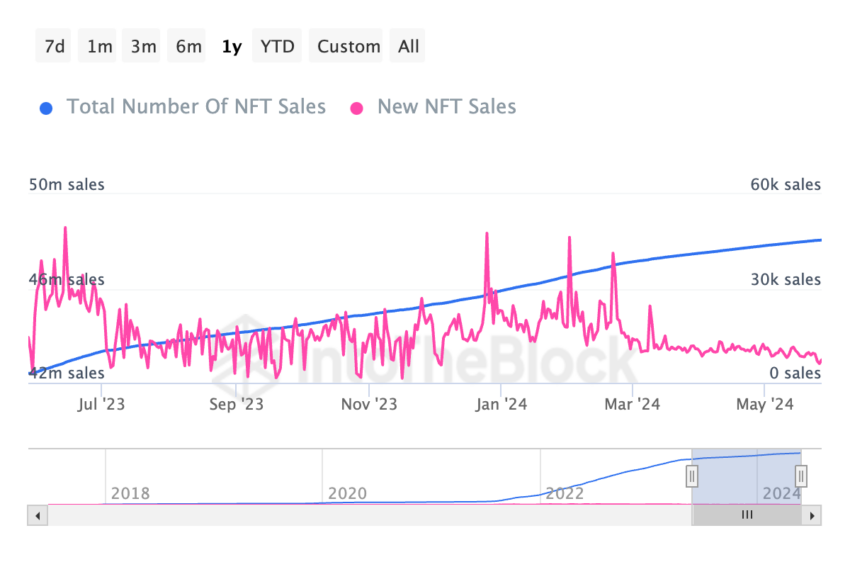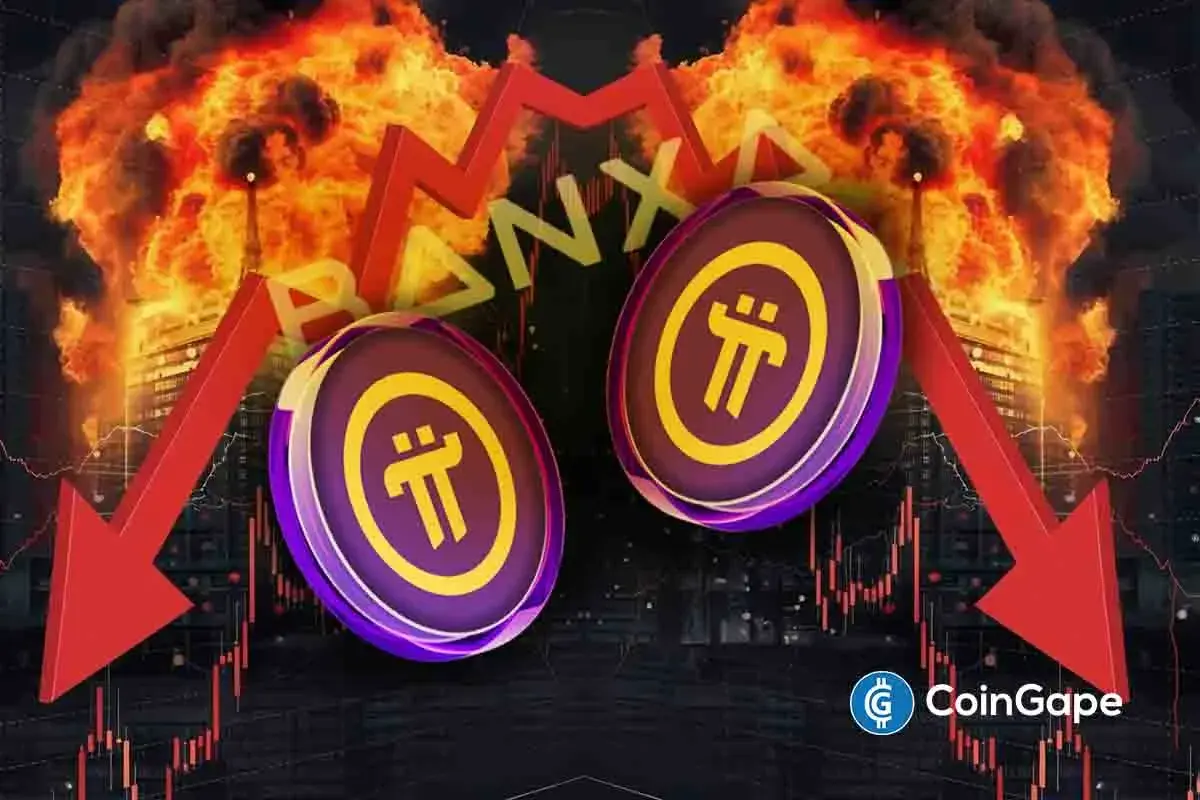Market
Are NFTs Dead? OpenSea CEO Shares Exclusive Insights

In an exclusive interview with BeInCrypto, Devin Finzer, co-founder and CEO of OpenSea, discussed the state of NFTs and the future of the digital marketplace.
Amid speculations about the decline of NFTs, Finzer provided a clear vision of continued growth and innovation.
The Rise of Gaming and Physically Backed NFTs
Finzer highlighted that NFTs are not dead. In fact, gaming and physically backed NFTs are areas of growing interest among market participants.
For this reason, OpenSea has partnered with Courtyard on projects involving Pokémon cards and with leading game developers like Parallel and Revolving Games.
“We see emerging use cases popping up on OpenSea all the time. Ensuring OpenSea is a home to all types of NFTs is crucially important to onboard the next wave of collectors,” Finzer told BeInCrypto.
OpenSea has also revamped its collection pages, offering creators richer, customizable pages to tell their project’s story. This adaptability extends across various types of NFTs, whether profile pictures, games, or physical items.
According to Finzer, the platform is committed to evolving with new utility trends, ensuring the marketplace remains one of the best places to buy, sell, and collect NFTs.
Read more: 7 Best NFT Marketplaces You Should Know in 2024

For now, OpenSea’s significant focus is enhancing the user experience in gaming. The company has introduced immersive game trailer videos and a new standard for redeemables, which enhance the core user experience. These features aim to deepen OpenSea’s verticalization for specific NFT areas.
“A good example of this is gaming where it’s important to have gameplay highlighted through video,” said Finzer.
The massive gaming industry is expected to drive the adoption of NFTs. As more gamers become first-time NFT owners, a frictionless onboarding experience becomes essential.
Finzer noted the importance of gamers experiencing the game before purchasing an NFT pass, which requires richer merchandising. He also highlighted the potential of interoperability, where items or statuses earned in one game could unlock experiences in another, facilitated by open digital ecosystem standards.
The Journey to One Million More NFT Users
The crypto market’s recent uptick has sparked innovation, with infrastructure improvements making NFT transactions more engaging and cost-effective. Finzer believes these developments are essential for onboarding the next wave of users.
“We believe these investments are an important foundation for onboarding the next million users,” he said.
For instance, OpenSea’s new cold start onboarding experience simplifies wallet creation and broadens the use of fiat payments. The only thing a user needs is an email to create an OpenSea account with a self-custodial wallet. This integration allows users to buy, sell, send, and receive digital assets and NFTs seamlessly, a crucial step for new entrants to the crypto ecosystem.
Finzer also expressed his admiration for Parallel, a leader in the Web3 gaming sector, highlighting their engaging and ambitious projects. He sees the expansion of utility-backed NFTs as vital for the industry’s growth.
“If our space is going to continue to grow and expand beyond the core community, we need to continue to see more collections coming to life with real-world utility,” he stated.
Read more: How To Create an NFT for Free Using Picsart
Despite the volatility of the NFT market, Finzer remains optimistic about its future. He wants to continue building out new features and opportunities to ensure a safe place at the forefront of the NFT sector.
“As new utility comes to life, we’ll evolve the marketplace to better merchandise and bring to life the utility behind an NFT,” he affirmed.
Finzer’s insights dispel the notion that NFTs are dead. Instead, these digital assets are evolving, with new use cases, improved infrastructure, and innovative features driving the space forward.
Disclaimer
Following the Trust Project guidelines, this feature article presents opinions and perspectives from industry experts or individuals. BeInCrypto is dedicated to transparent reporting, but the views expressed in this article do not necessarily reflect those of BeInCrypto or its staff. Readers should verify information independently and consult with a professional before making decisions based on this content. Please note that our Terms and Conditions, Privacy Policy, and Disclaimers have been updated.
Market
Solana (SOL) Price Rises 13% But Fails to Break $136 Resistance

Solana (SOL) has climbed 13% over the past seven days, showcasing strong short-term performance. While momentum indicators like the RSI and EMA lines remain supportive, recent price action suggests that bullish strength may be stalling just below a key breakout point.
At the same time, the sharp drop in BBTrend indicates weakening trend strength and fading volatility, often a sign of incoming consolidation or market indecision. With technicals at a crossroads, SOL’s next move will likely depend on whether buyers can regain control or if a broader pullback begins to unfold.
SOL RSI Rises Sharply, but Pause in Momentum Signals Caution
Solana’s Relative Strength Index (RSI) is currently at 60.35, marking a noticeable rise from 45 just two days ago.
This jump signals growing bullish momentum, although the RSI has remained stable since yesterday, suggesting that upward pressure may be easing for now.
The increase reflects renewed buying interest in recent sessions, pushing SOL closer to overbought territory but not quite there yet. This leveling off could indicate that the market is taking a breather before deciding its next move.

The RSI is a momentum oscillator that measures the speed and magnitude of price movements, ranging from 0 to 100. Values above 70 typically indicate that an asset is overbought and may be due for a pullback, while readings below 30 suggest oversold conditions, potentially signaling a buying opportunity.
With Solana’s RSI at 60.35, the asset is approaching bullish territory but hasn’t yet entered an extreme zone.
This positioning suggests that while recent momentum is positive, SOL could face some short-term consolidation or resistance before continuing higher—unless strong buying interest resumes and pushes the RSI closer to overbought levels.
SOL Trend Strength Weakens as BBTrend Falls Below 6
Solana’s BBTrend indicator is currently at 5.69, a significant drop from the 17.5 reading observed just four days ago.
This sharp decline suggests that volatility around SOL’s price has cooled notably, and the strength of the prior trend is weakening.
While BBTrend doesn’t signal direction on its own, the drop indicates that the strong movement, likely bullish, has lost momentum, and SOL may be entering a phase of consolidation or uncertainty.

BBTrend, short for Bollinger Band Trend, measures the strength of a price trend based on the expansion or contraction of Bollinger Bands.
Higher values suggest a strong, directional move (either up or down), while lower values point to weaker trends and reduced volatility. With BBTrend now at 5.69, Solana is in a much less volatile environment, which often precedes a breakout or a reversal.
For now, this reading signals that the recent momentum is fading. Unless volatility picks up again, SOL’s price may remain range-bound in the short term.
Golden Cross Looms for SOL, But $136 Barrier Still Holding Strong
Solana’s EMA lines continue to reflect a bullish structure, with the short-term average trending above the long-term one—suggesting that positive momentum remains intact.
A potential golden cross is also forming, which, if confirmed, would further reinforce the bullish outlook.
However, despite this favorable setup, Solana price has struggled to break through the $136 resistance level over the past few days, indicating that buyers may be losing steam at this key threshold.
Tracy Jin, COO of MEXC told BeInCrypto:
“Amid widespread volatility, Solana has stood out with notable strength. A combination of favorable technical setups and institutional tailwinds — such as the launch of the first spot Solana ETFs in North America — has helped drive a short-term rally. The token’s reclaim of leadership in decentralized exchange activity and rising total value locked further support the bullish case.”

If SOL manages to push above $136 with strong volume, it could open the path toward the next targets at $147 and potentially higher. But if the current momentum fades and the price reverses, a test of support at $124 becomes likely.
About Solana next moves, Jin told BeInCrypto:
“Despite recent gains, SOL’s near-term outlook remains sensitive to broader liquidity conditions. Any deterioration in market confidence — whether from macro shocks or renewed volatility in Bitcoin — could cap upside potential.”
A breakdown below that could accelerate losses toward $112, and in the event of a deeper correction, SOL could even revisit the $95 region.
Disclaimer
In line with the Trust Project guidelines, this price analysis article is for informational purposes only and should not be considered financial or investment advice. BeInCrypto is committed to accurate, unbiased reporting, but market conditions are subject to change without notice. Always conduct your own research and consult with a professional before making any financial decisions. Please note that our Terms and Conditions, Privacy Policy, and Disclaimers have been updated.
Market
Pi Network Roadmap Frustrates Users Over Missing Timeline

Pi Network released its Mainnet Migration Roadmap today. The roadmap lays out a three‑phase plan to move tens of millions of Pioneers who are still waiting to be moved to the open network. It also introduces new rewards, such as referral bonuses.
However, unlike most project roadmaps, Pi network didn’t provide any estimated date or timeline. This lack of clarification has frustrated early adopters who still await key rewards and clarity on rollout pacing.
Pi Network’s Three‑Phase Migration Plan
According to the roadmap, Pi Network will first complete initial migrations for Pioneers already in the queue. This batch covers verified base mining rewards, Security Circle contributions, lockup commitments, utility‑app usage rewards, and confirmed Node rewards for some operators.
After clearing the first wave, the team will tackle second migrations, adding all referral mining bonuses linked to KYC‑verified team members. Pi says these referral rewards will follow once the current queue finishes.
Finally, the network will move into ongoing periodic migrations—potentially monthly or quarterly—to process any remaining bonuses and rewards.
The cadence “is to be determined,” the roadmap notes.
Community Concerns and Critical Gaps
A thorough observation reveals several gaps and potential concerns in the roadmap.
For one, the plan never discloses how many Pioneers remain in the queue or the network’s daily migration capacity. Without those figures, users can’t predict when their own migration will occur.
Node operators report that some “confirmed Node rewards” have landed, but criteria for qualification remain opaque. Early node runners worry they may miss out without clear benchmarks.
Many Pioneers say they have tapped their claim buttons daily since migration opened yet still lack basic mining rewards. They question whether those base rewards and deferred referral bonuses will ever arrive in phase two.
Also, the roadmap admits the UI’s “Transferable Balance” underestimates actual migrated amounts to save resources. Users fear this pessimistic display could erode trust if their true balances remain hidden.
“I thought we were mining all of these PI coins this whole time? I thought the security circles were the Consensus Mechanism. It kinda seems to me like there isn’t a blockchain, and never was one. What kind of “Blockchain protocol” would “Require” all tokens to be minted at genesis?” one community member wrote.
Crucially, Pi offers no audit or error‑resolution process for users who spot mismatches in their historical mining data.
Given six years of complex records, occasional disputes seem inevitable, but the roadmap remains silent on redress.
All migrations hinge on KYC completion, yet the team omits any scaling targets or timelines for identity verification. A bottleneck here could stall every subsequent phase.
The schedule also ignores how major token unlock events—such as the roughly 108.9 million PI tokens due to release this month—will align with migration waves.

Finally, some Pioneers challenge the project’s foundational narrative. They note that Pi’s statement “all tokens were minted at genesis” contradicts six years of “mining.”
This raises doubts about whether Pi ever operated on a true blockchain protocol.
In the past month, PI price has dipped by over 45%. To sustain momentum and community trust, the team must now supply concrete timelines, transparent criteria, and clear audit paths for its Mainnet migration.
Disclaimer
In adherence to the Trust Project guidelines, BeInCrypto is committed to unbiased, transparent reporting. This news article aims to provide accurate, timely information. However, readers are advised to verify facts independently and consult with a professional before making any decisions based on this content. Please note that our Terms and Conditions, Privacy Policy, and Disclaimers have been updated.
Market
MEME Rallies 73%, BONE Follows

The meme coin market is experiencing a surge in investor interest, helping certain tokens recover from their all-time lows (ATLs). Memecoin (MEME) is one such token that has avoided a new ATL and also posted a significant 73% rise.
BeInCrypto has analyzed two other meme coins that have performed well over the past day, making them important tokens to watch.
Memecoin (MEME)
- Launch Date – November 2023
- Total Circulating Supply – 43.11 Billion MEME
- Maximum Supply – 69 Billion MEME
- Fully Diluted Valuation (FDV) – $135.37 Million
MEME had a rough week, hitting a new all-time low at $0.00137. However, the altcoin rebounded sharply, rising by 38% in the last 24 hours to trade at $0.00196. This surge marks a significant recovery, driven by renewed interest in meme coins.
The recent surge in MEME’s price was fueled by a sudden spike in interest for joke tokens, driving a 73% intraday high. To maintain its gains, MEME must successfully breach and flip the $0.00228 resistance into support, a critical level for sustaining its upward momentum.

If MEME experiences profit-taking from investors, it could reverse course and drop back down to the all-time low of $0.00137. A decline through this level would invalidate the bullish outlook and signal further challenges for the meme coin.
Bone ShibaSwap (BONE)
- Launch Date – July 2021
- Total Circulating Supply – 249.89 Million BONE
- Maximum Supply – 250 Million BONE
- Fully Diluted Valuation (FDV) – $71.67 Million
BONE posted an impressive 18.5% rise over the last 24 hours, trading at $0.285. The altcoin is currently under the key resistance of $0.295. Given the recent momentum, it seems poised to breach this level, signaling a potential upward trajectory for the token in the near future.
Flipping the $0.295 resistance into support would open the door for BONE to target its next major resistance at $0.348. A sustained push above this level could drive further bullish sentiment, propelling the token toward even higher price levels.

However, if BONE fails to breach $0.295, the bullish momentum could fade. A decline from this point could send the meme coin back towards $0.232, invalidating the optimistic outlook. Such a reversal would likely create caution among investors, delaying potential upward movement.
- Launch Date – April 2024
- Total Circulating Supply – 999.96 Million BAN
- Maximum Supply – 1 Billion BAN
- Fully Diluted Valuation (FDV) – $40.54 Million
BAN, a small-cap token, has caught the attention of investors, rising nearly 25% in the last 24 hours to trade at $0.040. This surge highlights the growing interest in the meme coin market, with BAN standing out despite its smaller market capitalization.
Inspired by the infamous banana taped to a wall, BAN gained significant fame after being purchased by Tron’s founder, Justin Sun, for $6.2 million last year. If the token continues its upward momentum, it could breach the $0.045 barrier and potentially flip it into support, securing its gains.

However, failing to break through the $0.045 resistance could lead to a drop back to $0.032. If this occurs, it would invalidate the bullish outlook and erase the recent gains, putting investors on alert for further price declines.
Disclaimer
In line with the Trust Project guidelines, this price analysis article is for informational purposes only and should not be considered financial or investment advice. BeInCrypto is committed to accurate, unbiased reporting, but market conditions are subject to change without notice. Always conduct your own research and consult with a professional before making any financial decisions. Please note that our Terms and Conditions, Privacy Policy, and Disclaimers have been updated.
-

 Ethereum23 hours ago
Ethereum23 hours agoEthereum Investors Suffer More Losses Than Bitcoin Amid Ongoing Market Turmoil
-

 Market20 hours ago
Market20 hours agoEthereum Price Fights for Momentum—Traders Watch Key Resistance
-

 Altcoin19 hours ago
Altcoin19 hours agoExpert Predicts Pi Network Price Volatility After Shady Activity On Banxa
-

 Altcoin24 hours ago
Altcoin24 hours agoDogecoin Price Breakout in view as Analyst Predicts $5.6 high
-

 Ethereum16 hours ago
Ethereum16 hours agoEthereum Fee Plunges To 5-Year Low—Is This A Bottom Signal?
-

 Altcoin23 hours ago
Altcoin23 hours agoTron Founder Justin Sun Reveals Plan To HODL Ethereum Despite Price Drop
-

 Market17 hours ago
Market17 hours agoIs XRP’s Low Price Part of Ripple’s Long-Term Growth Strategy?
-

 Market19 hours ago
Market19 hours agoXRP Price Weakens—Further Losses on The Table?























